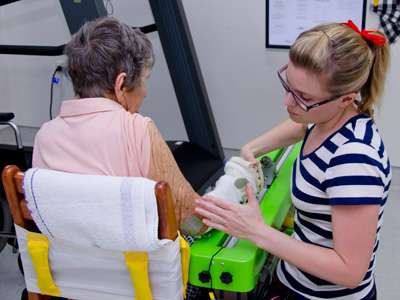SMART Arm helps stroke survivors recover faster

(Medical Xpress)—A non-robotic device that helps stroke survivors regain upper limb movement is expected to be commercially available in Australia within the next 12 months.
Sensory-Motor Active Rehabilitation Training Arm (SMART Arm) is a device developed by researchers from The University of Queensland and James Cook University.
The device enables stroke survivors with upper limb weakness to drive their own rehabilitation through feedback on performance via an interactive computer program and incremental increases in load and reaching range.
The team included Dr Ruth Barker, from JCU's School of Public Health, Tropical Medicine and Rehabilitation Sciences, and UQ School of Health and Rehabilitation Sciences researchers Associate Professor Sandy Brauer, PhD student Kate Hayward and School of Human Movement Studies researchers Prof Richard Carson and Dr David Lloyd.
"Every year, over three million stroke survivors try to regain use of their upper limbs," Dr Barker said.
Associate Professor Brauer is leading an NHMRC-funded clinical trial taking place at Brisbane's Princess Alexandra and Queen Elizabeth II hospitals to improve outcomes immediately after stroke.
"SMART Arm is one of the few interventions shown to result in positive changes in neural plasticity in people with severe paralysis after chronic stroke, so,we're very keen to see the device become available to as many as possible, as soon as possible," Associate Professor Brauer said.
"There is evidence that the brain has greater capacity for plasticity early following stroke, so we are undertaking a trial of SMART Arm training in patients who have just had a stroke, to take advantage of an optimal window for neural recovery."
Trial participants have been split into three groups; the first group receives the usual care of physiotherapy and occupational therapy to get their arm moving again.
The second group receives usual care and SMART Arm and the third group have the addition of electrical stimulation from the SMART Arm device to help straighten out their arm.
Trial participant Helen Vasicek suffered a stroke in August 2011 at 52 and became paralysed down the left hand side of her body.
"My life came to a complete standstill," Mrs Vasicek said.
"I went from a self-sufficient, able-bodied person who worked full-time while looking after my family and home to facing the rest of my life in a wheelchair with little ability to move."
During the clinical trials, Mrs Vasicek used the SMART Arm device to repetitively move her arm for 30 minutes a day over four weeks.
"Seeing the results of even the tiniest movement was extremely encouraging," Mrs Vasicek said.
"I believe the SMART Arm would be beneficial to anyone whose range of movement is limited through stroke or disability.
"Having access to the SMART Arm as soon as possible after suffering a stroke will have great benefit to the sufferer and give them greater confidence in the success of their recovery – it gives us renewed hope."
SMART Arm Pty Ltd, the start-up enterprise from The University of Queensland's main research commercialisation company UniQuest secured investment from Townsville Mackay Medicare Local (TMML).
UniQuest Managing Director, David Henderson, said SMART Arm Pty Ltd was formed as a partnership between TMML, UQ and JCU to further develop, manufacture and market the technology, which originates from multi-disciplinary research at two Queensland universities.
"This partnership demonstrates how collaborations between universities, research disciplines, and industry can translate into real and practical benefits for the wider community," Mr Henderson said.
SMART Arm training has been found to improve arm function, arm muscle activation and neural plasticity in people with chronic stroke, with the last finding published in the July 2012 issue of Experimental Brain Research.










